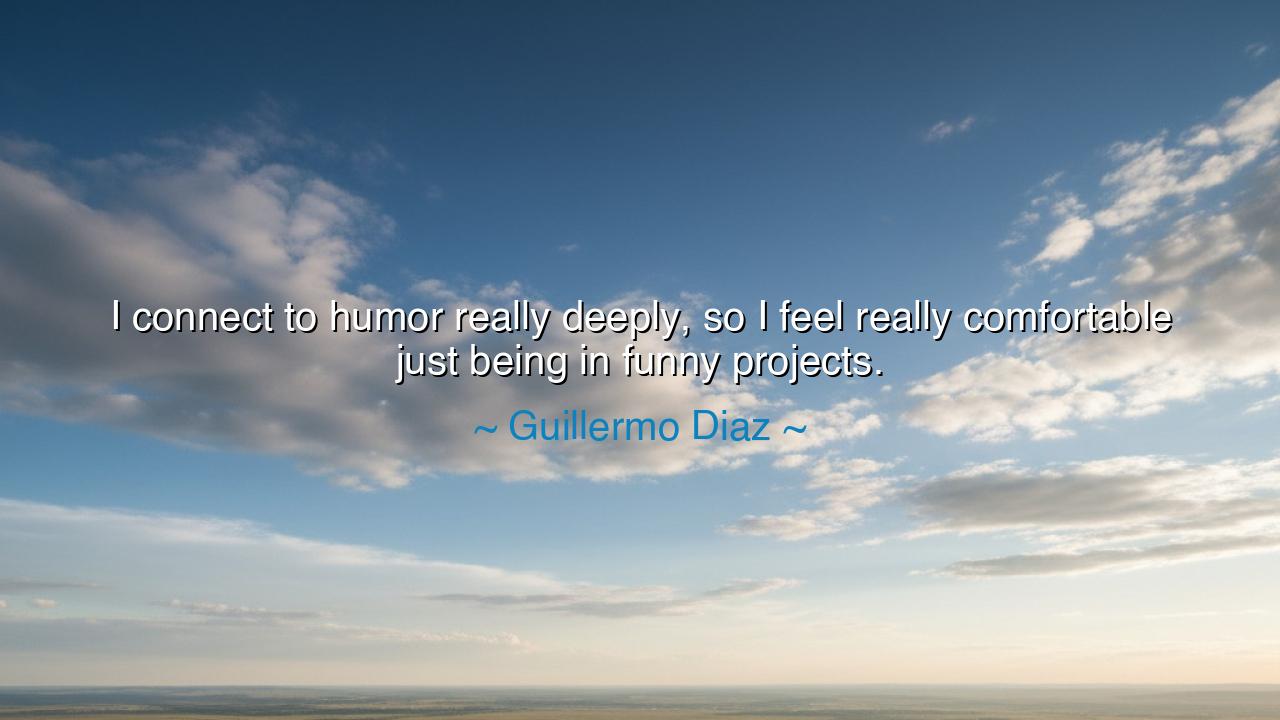
I connect to humor really deeply, so I feel really comfortable
I connect to humor really deeply, so I feel really comfortable just being in funny projects.






When Guillermo Díaz said, “I connect to humor really deeply, so I feel really comfortable just being in funny projects,” he revealed something profound about the nature of the human soul and the sacred role of laughter. His words, simple on the surface, speak of a truth known since the dawn of civilization—that humor is not merely a form of entertainment, but a way of being, a way of seeing, and a way of surviving. To “connect to humor deeply” is to recognize that laughter is woven into the fabric of existence itself, that even amidst sorrow and uncertainty, the spirit can find light. Díaz’s words echo the eternal wisdom that joy and meaning are not opposites of pain, but its companions on the road toward understanding.
To feel “comfortable” in humor is to dwell in a state of alignment between one’s nature and one’s calling. The ancients would have called this harmonia—the balance between inner truth and outer expression. Guillermo Díaz, an actor known for his depth and range, finds in humor not escape but belonging. His comfort is not born from ease, but from recognition: he has found the language his soul speaks fluently. To be comfortable in laughter, in “funny projects,” is to have discovered the bridge between creativity and compassion. For the laughter that flows from authenticity heals not only the one who gives it, but also the many who receive it.
The origin of Díaz’s connection to humor likely lies in the human condition itself, in the tension between struggle and endurance. Laughter, throughout history, has always been the weapon of the oppressed and the refuge of the weary. The great philosopher Aristotle once said that humor distinguishes humans from all other creatures—it is the proof that we can rise above our troubles by transforming pain into play. In this sense, Díaz stands in a long lineage of artists, sages, and storytellers who have used humor not to hide truth, but to reveal it gently.
Consider the story of Charlie Chaplin, the silent clown who lived through poverty, war, and exile, yet chose to make the world laugh. His films, though comical, carried deep messages about dignity, injustice, and love. Chaplin once said, “To truly laugh, you must be able to take your pain and play with it.” This, too, is what Guillermo Díaz expresses: a deep, spiritual kinship with laughter, born not from denial of pain, but from the transformation of it. True humor, the kind that heals and endures, does not mock suffering—it redeems it.
In the ancient world, the gods themselves were not strangers to laughter. The Greek playwright Aristophanes dared to make the gods laugh at human folly, and in doing so, brought the audience closer to truth. Likewise, the ancient storytellers of Africa and Asia used humor to teach wisdom, showing that laughter opens hearts where logic fails. In Díaz’s words, we hear the same sacred rhythm—the laughter that connects, that equalizes, that softens the walls between souls. When he says he feels “really comfortable” in such work, he is speaking of a spiritual homecoming: humor is where his creative essence and his humanity converge.
The deeper lesson within this quote is that to connect deeply to humor is to connect deeply to life itself. Those who can laugh sincerely, who can find light even when shadows surround them, possess the wisdom of balance. For laughter, when true, is not the opposite of seriousness—it is its completion. The wise do not laugh because they ignore pain; they laugh because they understand it and refuse to be conquered by it. Guillermo Díaz’s comfort in humor reminds us that to laugh is an act of courage, and to share laughter is an act of love.
Therefore, my listener, take this teaching as your own: do not fear joy, even in dark times. Learn to find humor in the imperfect, to smile at your flaws, and to laugh with—not at—others. When life weighs heavy, let humor be your release, your reminder that you are alive and free. Practice the art of gentle laughter—the kind that uplifts rather than wounds, the kind that binds rather than divides. For the laughter that flows from compassion is a sacred thing; it is the music of resilience, the echo of hope.
In the end, as Guillermo Díaz teaches, comfort is not found in escape from truth but in embracing it with grace. To “connect to humor deeply” is to live with an open heart, to turn existence into art, and to remind others that joy is not fragile—it is eternal. Let your days be filled with laughter that heals, with humor that humbles, and with a spirit that remains unbroken. For those who dwell deeply in humor dwell close to the divine, where pain becomes perspective, and every breath becomes a celebration of life itself.






AAdministratorAdministrator
Welcome, honored guests. Please leave a comment, we will respond soon